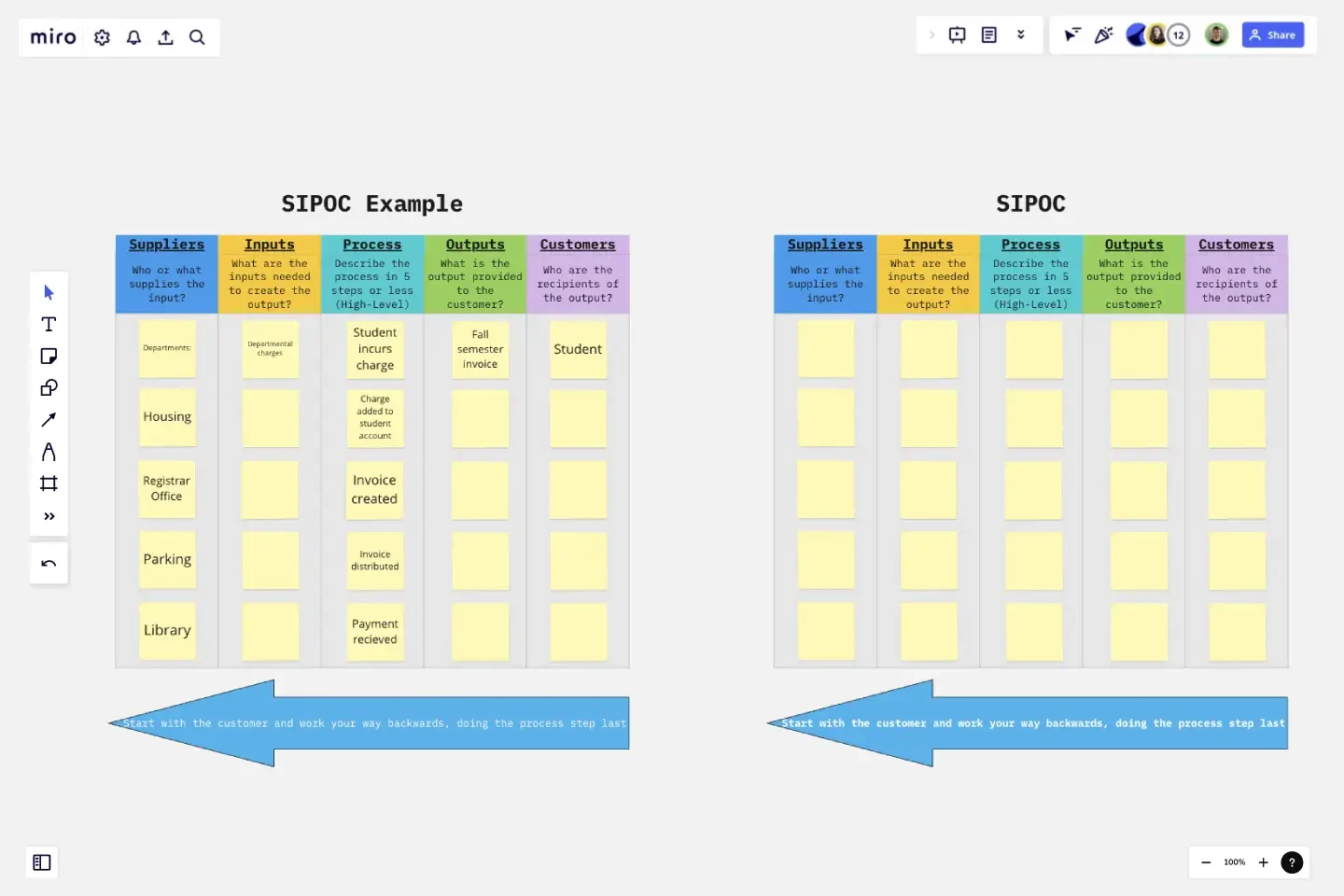SIPOC by Dagmar Vlahos
The SIPOC Template can be used as the first step in understanding the process being evaluated.
This template is designed to be utilized as a brainstorming tool during the project documentation stage with a team to identify customers and suppliers (stakeholders).
How to use the SIPOC Template:
(Start with the Customers and work backwards)
Step 1: Customers
Brainstorm with the team to identify the customers who receive the output the process creates.
Step 2: Outputs
Articulate the outputs of the process that gets delivered to the customer.
Step 3: Inputs
Document the inputs that are needed to create the output.
Step 4: Suppliers
Identify who or what supplies the input required to create the output.
Step 5: Process
Describe the high-level steps that make up the process in 5 steps or less.
This template is a collaborative effort
Utilizing an approach of collaboration, Dagmar Vlahos and Thomas Lencki Jr. lead employees through their Lean journey. They support all employees at all of the campuses in University System of New Hampshire through training, mentorship, and coaching. Using this approach Dagmar and Tom created this template together.
#Lean all day, every day!
This template was created by Dagmar Vlahos.
Get started with this template right now.
Reflection Island: End of Year Team Retro
Works best for:
Retrospectives, Agile Methodology, Meetings
The Reflection Island: End of Year Team Retro template offers a creative and themed approach to retrospectives, perfect for wrapping up the year. It provides elements for reflecting on achievements, challenges, and goals using a tropical island theme. This template enables teams to celebrate successes, learn from setbacks, and set intentions for the upcoming year in a relaxed and enjoyable atmosphere. By promoting reflection and celebration, the Reflection Island: End of Year Team Retro empowers teams to strengthen bonds, boost morale, and start the new year with renewed energy and focus effectively.
Sprint Planning with Jira Template
Works best for:
Sprint Planning, Agile
The Sprint Planning with Jira template in Miro is a powerful tool designed to streamline and enhance your sprint planning sessions. One of the key benefits of this template is its Jira integration, which saves time and effort when planning and aligning teams. By integrating directly with Jira, the template allows for seamless import and management of tasks, ensuring that all your Jira tickets are up-to-date and easily accessible within Miro. This reduces the need for manual updates and minimizes errors, making the planning process more efficient and effective.
Starfish Retrospective
Works best for:
Retrospectives, Agile Methodology, Meetings
The Starfish Retrospective template offers a structured approach to retrospectives using the metaphor of a starfish. It provides elements for identifying what to start, stop, continue, do more of, and do less of. This template enables teams to reflect on past iterations, identify actionable insights, and prioritize improvements. By promoting clarity and focus, the Starfish Retrospective empowers teams to drive meaningful change and continuous improvement effectively.
Start, Stop, Continue Template
Works best for:
Retrospectives, Meetings, Workshops
Giving and receiving feedback can be challenging and intimidating. It’s hard to look back over a quarter or even a week and parse a set of decisions into “positive” and “negative.” The Start Stop Continue framework was created to make it easier to reflect on your team’s recent experiences. The Start Stop Continue template encourages teams to look at specific actions they should start doing, stop doing, and continue doing. Together, collaborators agree on the most important steps to be more productive and successful.
Scrum Compass
Works best for:
Agile, Meetings, Workshops
The Scrum Compass is a visual tool for guiding Scrum teams through their journey. It provides a structured framework for understanding Scrum roles, events, artifacts, and values. This template offers a comprehensive overview of Scrum principles and practices, enabling teams to align on common goals, roles, and processes. By promoting clarity and alignment, the Scrum Compass empowers teams to navigate the complexities of Agile development and deliver value with confidence and efficiency.
I Like | I Wish | I Wonder
Works best for:
Agile
Feedback is a key part of any project development and crucial to the iterative process.
